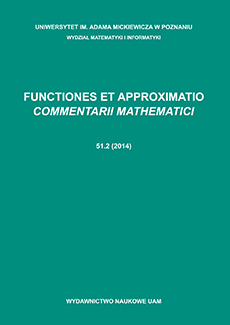Abstract
Motivated by a recent result of Farhi we show that for each $n\equiv \pm 1\pmod{6}$ the title Diophantine equation has at least two solutions in integers. As a consequence, we get that each (even) perfect number is a sum of three cubes of integers. Moreover, we present some computational results concerning the considered equation and state some questions and conjectures.
Citation
Maciej Ulas. "A note on the Diophantine equation $2^{n-1}(2^{n}-1)=x^3+y^3+z^3$." Funct. Approx. Comment. Math. 60 (1) 87 - 96, March 2019. https://doi.org/10.7169/facm/1700





